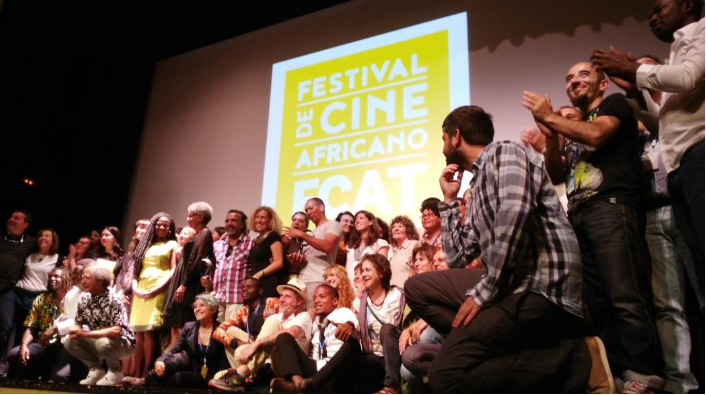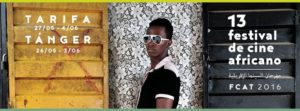I have a huge interest in Arab cinema, and even wrote about Egyptian Cinema for my MA thesis as SOAS (You can read the article I wrote for Safar 2014, Ten things you didn’t know about Egyptian Cinema). So in the excitement about the third edition of The Arab British Centre’s Safar Film Festival, I came across The African Film Festival of Tarifa (FCAT). FCAT is the only Spanish festival that dedicates all its programming to African contemporary culture. Given my love for film and curiosity about creativity from Africa, it seemed like a sign from my motherland, and I was fortunate enough to represent The Arab British Centre during the festival.
After four years in Córdoba, this year’s FCAT returned to the city where it all started in 2003, Tarifa, Spain. Standing on the other side of the Strait of Gibraltar is the city of Tangiers, where the festival continues in parallel, making FCAT the first cross-border festival to build a bridge between two continents through cinema.
The festival opened on 26 May 2016 at the Cinémathèque de Tanger, in Morocco, and on 27 May 2016 at the Teatro de la Alameda in Tarifa. For 9 days the festival celebrated Africa’s finest film artists by showcasing the richness and diversity of African films and African contemporary culture. In her opening speech, the festival’s director, Mane Cisneros, stated that only reciprocal knowledge can enable understanding between peoples, a precondition for freedom and respect. “The festival will use culture to bring back together that which borders have separated”.
This year’s FCAT film programme included 76 tiles from 26 countries. Arab cinema was highly represented in FCAT 2016 with a total of 26 titles coming from Morocco (11), Algeria (5), Egypt (5), Tunisia (4) and Sudan (1). (You can check the festival’s film programme from A to Z here)
I had the honour to chat to Marion Berger, this year’s festival programmer, about her rationale for the film selection. She informed me that the selection criteria was based on artistic quality, originality and diversity. Marion’s desire is to ‘mainstream’ African cinema. “We need to consider that cinema houses keep closing down in many African countries and there is a general film distribution crisis affecting the continent. This is why most of the films in FCAT’s programme are more well-known in the festival circuits than in their home countries”.
Of course, I was enthusiastic about the film programme, but MORE excited about the rare opportunity to join enthusiasts and film industry specialists at this years ‘El Árbol de las Palabras’ – a week long training forum on contemporary African cinema. The forum capitalized on the presence of filmmakers, film critics and cinema experts and I felt really privileged to hear conversations with film industry experts such as Morocco’s Hicham Falah, Director of the International Documentary Festival of Agadir (Fidadoc), Malika Chagal and Hélène Jiménez from Cinémathèque de Tanger and Reda Benjelloun, Director of the Information and Documentary Magazines of the Moroccan TV channel 2M among many others.
I learned that the Moroccan film industry stands out as a unique case in the Middle East with its joys and challenges. Film schools have sprung up across Morocco with over 1000 students graduating each year. The country has found its place in the global film industry serving as the set for many international films. However during at FCAT I learned about the challenges the industry faces with film distribution. There are currently more cinema festivals than cinema houses in the country -only around 40 remain open compared to the 250 that there used to be twenty five years ago. Thankfully, the government’s Assistance Fund for Film Production and Exploitation that was set up in the 80’s, has not ceased its commitment and devotes over 5.5 million euros per year to support the production of fiction films in Morocco. Simultaneously, FIDADOC and 2M are working hard to support the creation and distribution of documentary films in order to bring back a documentary tradition in Morocco that existed during the 60’s and has since disappeared.
As well as ‘El Árbol de las palabras’, the festival provided a fantastic engagement programme with communities across Tangiers and Tarifa, such as a radio workshop for students, exhibitions, school screenings, storytelling session, and workshops and music concerts for families. Over 3,000 students participated in FCAT 2016. The week culminated in an award ceremony on 3 June to a completely packed house at Teatro de La Alameda in Tarifa. The event was livened up by the students from the Tarifa Music School who bid farewell to the festival to the rhythm of African lullabies. It was a triumphant night for Arab cinema. On the documentary side, Hisham Elladdaqi’s La Route du Pain (The Bread Road), took home the ‘Concord’s Award’ for the best documentary feature. Tunisian actress and singer Ghalia Benali received the award for Best Actress with her outstanding performance as the mother of the main character in A Peine J’ouvre les Yeux (As I Open My Eyes), a feature length film by Leyla Bouzid. The Award for the best short film, went to Farid Bentoumi’s Un Métier Bien (A Good Job), and Hassen Ferhani’s Fi Rassi Rond-Point (A Roundabout In My Head) received a special mention alongside Adlane Djemil for his performance in Madame Courage.
It is great to see Arab films receive such international acclaim over the past decade; often despite significant turmoil in the region. This evidences the perseverance, creativity, artistic quality and social commitment of the new generation of filmmakers in the Middle East.
I am eagerly anticipating the third edition of the Safar Film Festival which has been curated by renowned film curator and writer Rasha Salti, and will specifically mark a celebration of contemporary Arab cinema.
The third edition of The Safar Film Festival will return to the ICA from the 14 – 18 September 2016. Save the date and stay tuned for more announcements in July! We look forward to seeing you there.


